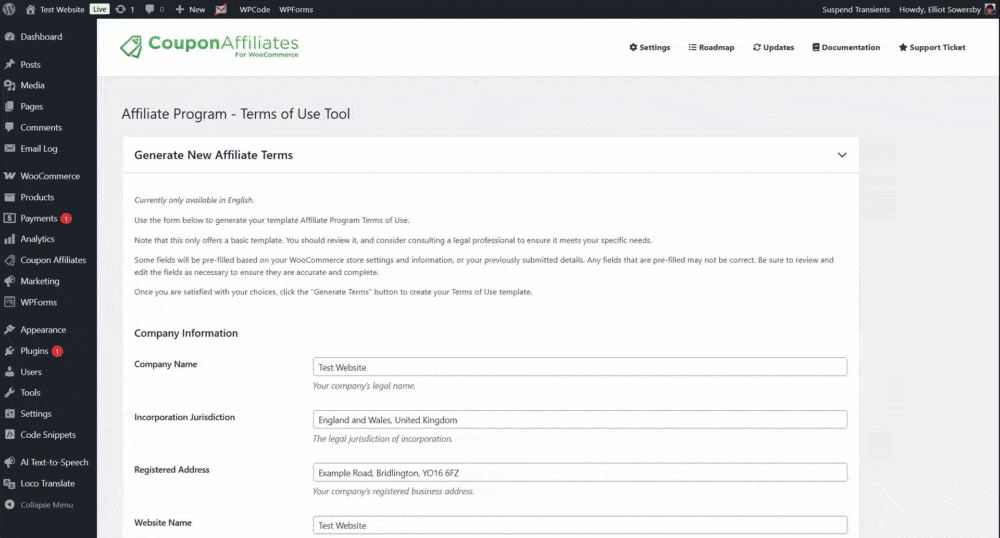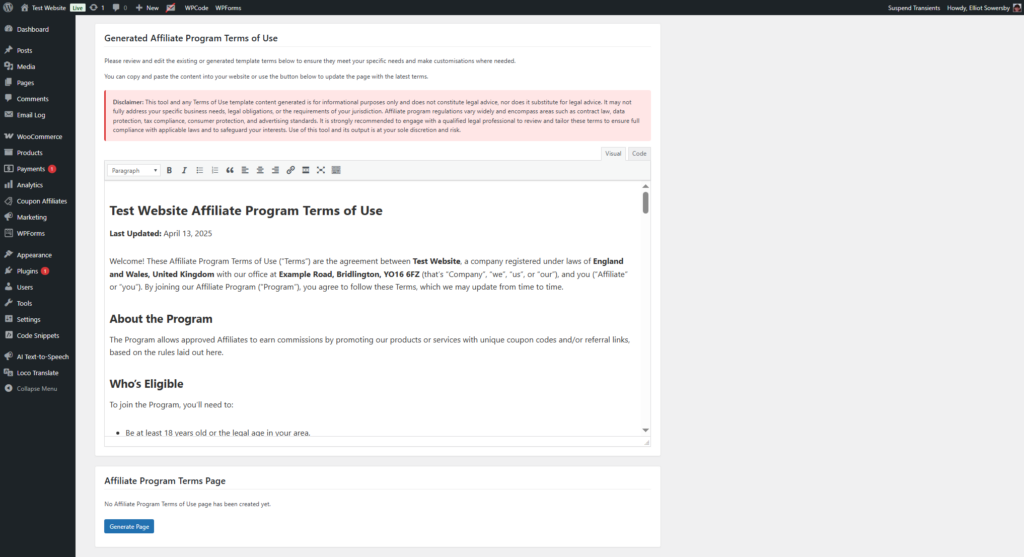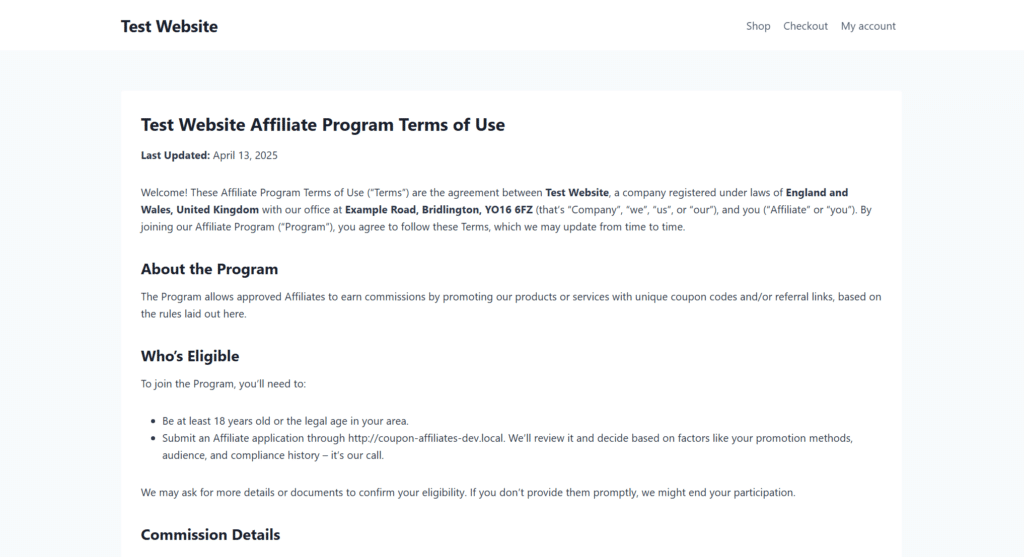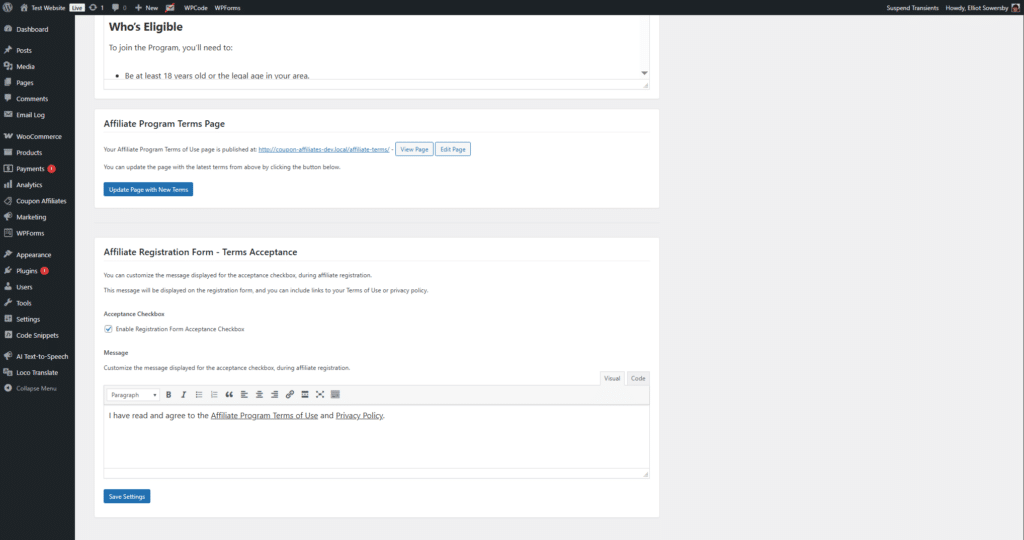How to Create an Affiliate Terms and Conditions Page
Listen to the audio version of this article (AI).
Running an affiliate program is an excellent way to grow your business, but it comes with responsibilities. One of the most critical being a clear and comprehensive Affiliate Terms and Conditions page.
This document outlines the rules, expectations, and legal framework for your affiliates, ensuring transparency and protecting both your business and your partners.
In this guide, we’ll walk you through the key elements to include in your Affiliate Terms and Conditions page and introduce a handy tool from the Coupon Affiliates plugin that simplifies the process.
Disclaimer: This article is for informational purposes only and does not constitute legal advice, nor does it substitute for legal advice. We strongly recommend consulting a qualified legal professional to ensure your terms meet your specific business needs and comply with applicable laws. CouponAffiliates.com and its contributors are not responsible for any legal consequences arising from the use of this information.
Why You Need an Affiliate Terms and Conditions Page
An Affiliate Terms and Conditions page serves as an agreement between you and your affiliates.
It clarifies how the program operates, what’s expected of participants, and how issues like payments, promotions, and termination are handled.
Without it, misunderstandings can lead to disputes, legal risks, or damage to your brand’s reputation. A well-crafted terms page helps:
- Set expectations: Define commissions, payment schedules, and acceptable promotion methods.
- Protect your business: Limit liability and outline termination rights.
- Ensure compliance: Address legal requirements like disclosure obligations and data privacy.
Key Elements to Include in Your Affiliate Terms and Conditions
Creating a terms page from scratch can feel daunting, but breaking it down into essential sections makes it manageable. Here some of the things to consider including:
1. Program Overview
Start with a brief summary of your affiliate program. Explain what affiliates will promote (e.g., products or services on your website) and how they’ll earn commissions through referrals. This sets the stage for the detailed rules that follow.
2. Eligibility and Enrollment
Specify who can join your program. Common criteria include:
- Minimum age (e.g., 18 or legal age in their jurisdiction).
- Application process and approval requirements.
- Content guidelines (e.g., no offensive or illegal websites).
3. Commission Structure
Detail how affiliates earn money:
- Rate: Percentage or fixed amount per sale (e.g., “20% of net revenue”).
- Definition: Clarify what “net revenue” means—typically sales minus refunds, taxes, and shipping.
- Exclusions: Note what doesn’t count toward commissions, like self-referrals or fraudulent sales.
4. Payment Terms
Outline the logistics of paying affiliates:
- Schedule: When payments are made (e.g., monthly, quarterly).
- Methods: Accepted payment options (e.g., PayPal, bank transfer).
- Threshold: Minimum earnings required for payout (e.g., $50).
5. Referral Tracking
Explain how referrals are tracked, such as through unique affiliate links or codes. Include the cookie duration (e.g., 30 days) during which sales are credited and prohibit self-referrals or tracking manipulation.
6. Promotion Guidelines
Set rules for how affiliates can market your offerings:
- Allowed methods: Blogs, social media, email marketing.
- Prohibited methods: Spam, deceptive ads, or bidding on your brand terms in paid search.
7. Disclosure Requirements
Require affiliates to disclose their relationship with your brand (e.g., “This is an affiliate link”) to comply with regulations like the FTC guidelines in the U.S.
8. Intellectual Property
Define how affiliates can use your trademarks, logos, or promotional materials. For example, allow use for promotion but prohibit it in domain names or misleading contexts.
9. Termination Rules
Clarify how and when participation can end:
- Notice period (e.g., 30 days).
- Immediate termination for breaches like fraud or brand damage.
- Final commission payments post-termination.
10. Legal Protections
Include clauses to safeguard your business:
- Indemnification: If affiliates cover losses from their misconduct.
- Liability Limits: Cap your responsibility for damages.
- Governing Law: Specify the legal jurisdiction (e.g., “State of California”).
11. Data Privacy and Confidentiality
Address compliance with laws like GDPR or CCPA, requiring affiliates to protect customer data and keep program details confidential.
12. Modifications
Reserve the right to update terms, with notice to affiliates via email or your website.
Third-Party Tools and Services for Generating Affiliate Terms
If writing terms from scratch isn’t your preference, several third-party tools and services provide dedicated affiliate terms generators or templates to create a starting point for your Affiliate Terms and Conditions.
Here are some options specifically tailored for this purpose:
- Wonder.Legal
Wonder.Legal offers an Affiliate Agreement template generator where you fill out a simple form with details like your company name and program specifics. It produces a customizable legal document designed for affiliate relationships, making it a quick and affordable option. - AM Navigator
AM Navigator, run by affiliate marketing expert Geno Prussakov, provides a downloadable Affiliate Program Agreement template. This detailed sample includes key clauses for affiliate terms and can be purchased for a nominal fee, offering a practical starting point crafted by an industry veteran. - WP Legal Pages
This WordPress plugin includes an Affiliate Agreement generator specifically for WordPress sites. It allows you to create tailored affiliate terms through a user-friendly interface, integrating seamlessly with your site. It’s ideal for website owners seeking an affordable, plugin-based solution without technical hassle. - Hiring a Lawyer
For a fully customized approach, hiring a lawyer provides a bespoke Affiliate Terms and Conditions document tailored to your business and jurisdiction. While not a generator, this option helps ensure precision and compliance, though it’s more costly and time-consuming compared to automated tools.
Simplify the Process with Coupon Affiliates’ Terms Generator
Crafting a terms page manually takes time, but if you’re using the Coupon Affiliates plugin for WordPress, you’re in luck.
The plugin includes an Affiliate Terms Generator tool that automates the process, saving you effort while providing a solid starting template to customise to your requirements.
How It Works
Access the Tool
In your WordPress dashboard, navigate to the Coupon Affiliates admin menu and go to the “Admin Tools” page, then select the “Terms & Conditions Generator”.
Enter Details
Fill in fields like your company name, website URL, commission rate, payment terms, and more. These will be mostly pre-filled for you based on your current affiliate program settings. Though you should customise them to ensure it is all correct.

Generate a Template:
Click the “Generate New” button.
The tool creates a comprehensive template terms document tailored to your inputs, complete with headings and formatted text ready for you to review and customise.

Create a Page:
Clicking the “Generate Page” button will generate a published page on your site (e.g., “/affiliate-terms”) that you can edit further if needed.

Registration Checkbox:
The plugin integrates the terms into your affiliate registration form, adding a customizable acceptance message (e.g., “I agree to the Affiliate Program Terms and Conditions”) with a link to the page.

Benefits
- Time-Saving: No need to write from scratch, the template helps you cover key areas and is easy to review and customise to your requirements.
- Editable: Use the built-in editor to tweak the content to your liking.
- Seamless Integration: Automatically links to your registration process for a professional user experience.
Disclaimer
This tool generates an affiliate program Terms of Use template for informational purposes only and does not constitute legal advice, nor does it substitute for legal advice. It may not fully address your specific business needs, legal obligations, or the requirements of your jurisdiction. Affiliate program regulations vary widely and encompass areas such as contract law, data protection, tax compliance, consumer protection, and advertising standards. It is strongly recommended to engage with a qualified legal professional to review and tailor these terms to ensure full compliance with applicable laws and to safeguard your interests. Use of this tool and its output is at your sole discretion and risk.
Final Thoughts
An Affiliate Terms and Conditions page is a must-have for any serious affiliate program.
It helps protect your business, informs your affiliates, and builds trust. By including the elements above, or leveraging the Coupon Affiliates Terms Generator, you can create a solid foundation quickly and efficiently. Just remember to pair it with legal expertise for peace of mind.
Ready to get started? Install the Coupon Affiliates plugin today and use the Terms Generator to streamline your setup. Happy affiliate marketing!
Elliot Sowersby is a WordPress developer from Yorkshire, United Kingdom. He is the founder and lead developer of Coupon Affiliates and RelyWP.




Leave a Reply